Science
The 2-Million-Year-Old Skeleton Mystery: Who Was This Ancestor?
09 February 2026

Is the European Union destined to follow the path of past unions of states and nations that disintegrated, despite predictions of a bright future? Many claim all is well, but warning signs are visible on the horizon. On one hand, there is a loop of indecisiveness, pseudo-ecological restrictions that hinder development, and military weakness. On the other, some extremisms drive countries into the arms of populists eager to restore self-centered nation-states.
History is replete with examples of coherent and efficiently functioning countries, including their associations, which collapsed under their weight or succumbed to external pressures. There are many similarities to today’s situation.
Cicero, a Roman writer, commander, and philosopher, spoke of “history as the teacher of life,” presumably hoping his compatriots would draw the right lessons from the past and defend the achievements of civilization. They did not. A few years after his death, the Republic he steadfastly supported fell. Much later, after five centuries, the Roman Empire also collapsed.
Will today’s politicians be more prudent? In an era of wars and a faltering global order, optimism is hard to come by. It seems that a breakdown of two key structures of the global order – the European Union and the United States – is still far off. However, it is worthwhile to examine examples from past centuries. Many analogies to the present can be drawn from them.
The migration of peoples caused the fall of the Western Roman Empire at the end of the 5th century AD – this is one of the most widely accepted theories. But could several hordes of unrefined barbarian tribes, sweep in from the East, really destroy the most powerful state of the ancient world, a state for which the Mediterranean Sea was practically an inland sea?
Today, we still admire the stone masterpieces of Roman architecture – arenas, arches, villas, temples, columns, libraries – from Morocco to Jordan, from Libya to France, from Sicily to Turkey. There is no country in Europe south of the Alps, nor in North Africa or the Middle East, without remnants of the empire. Archaeologists also discover Roman relics in Great Britain and Germany and even coins in Poland. Thus, it likely required significant forces and a convergence of adverse circumstances for such a power to fall. Therefore, not only were the Visigoths, Ostrogoths, Vandals, Huns, Franks, and Alans to blame, but also high taxes, inflation, growing wealth disparities, a labor shortage – a deficit of slaves, and the severing of trade routes. Do these issues sound familiar?
One of the reasons for the empire’s fall was its size. This size entailed disparities in living standards and lifestyles, as well as communication difficulties. Managing such a large structure in the face of external attacks was extremely difficult. The cost of defending the borders kept increasing. As spending on the military rose, the country’s civil infrastructure crumbled. The barbarians triumphed, whose resources, including human resources, were not blocked by any borders.

In the early 9th century, the empire of Charlemagne spanned over one million square kilometers, covering the territories of present-day France, Germany, Belgium, the Netherlands, Austria, Switzerland, and Italy. It symbolized Western Europe’s recovery from the devastating invasions of barbarians, with a flourishing of art and culture. In monastic schools, scribes copied biblical and ancient books. Seemingly strong, the state collapsed shortly after being divided among the emperor’s sons: Lothar, Charles the Bald, and Louis the German. They prioritized particular interests over the common good and failed to overcome the resistance of nobles who differed in language and tradition. In the west and south lived Romance-speaking populations, and in the east, Germanic.
The Byzantine Empire, a continuation of the Roman Empire and often unjustly forgotten, survived for over a thousand years. It dominated the continent. Surprisingly to many, Constantinople (located in present-day Turkey) was the most important and wealthiest city in Europe. There, political, economic, and cultural life was concentrated. It was also from there that wealth was generated and the world was governed. What is now the West was back then largely inaccessible marshes and swamps.
We recommend: Mental Slavery: Who Shapes European Culture?
At its peak, the Byzantine Empire encompassed most of the territories of the former Roman Empire around the Mediterranean Sea, including Italy, Spain, and Africa. It regained its power in the early 11th century during the reign of Basil II, known as the Bulgar Slayer. The fall of Byzantium, sealed by the Ottoman Turks’ capture of Constantinople in 1453, was due to invasions by stronger and more numerous, though technologically and culturally less advanced, Islamic Asian tribes. This mirrors the situation nearly a thousand years earlier when Rome fell. However, fratricidal conflicts among Christians themselves significantly contributed to Byzantium’s downfall.
The capture of Constantinople in 1204 by crusaders loyal to the Roman pope (a century and a half after the Church split into Eastern and Western branches) and the establishment of the Latin Empire there for over fifty years devastated already strained relations among Christians. Thus, Europeans, followers of the same religion, weakened each other, facilitating the task of external invaders.
Internal power struggles among claimants to the imperial throne, doctrinal disputes (even in the face of mortal danger, there remained distrust towards the West), and an inefficient economy were also significant. Taxes imposed on Greek peasants in Anatolia were so high that they welcomed Turkish rule with relief. The theme of poor economic policy as a reason for state collapse will reappear many times in history.
The Hanseatic League, formed in the 12th century, was an extraordinarily interesting, supranational, and very influential political entity. At its peak, it comprised 160 cities, including Hamburg, Krakow, Lübeck, Gdańsk, Toruń, Berlin, and Groningen, controlling trade across northern and central Europe. The League operated a fleet of 1000 ships that sailed the North Sea, the Baltic Sea, and their tributaries. It was so powerful that it waged its wars.
It was ultimately undone by the particular interests of individual states, or in modern terms, nationalism. It lost out to smaller, but more unified and more centralized state structures, primarily the Netherlands, England, and the Scandinavian countries of the Kalmar Union.
The final blow to the Hanseatic League came from unexpected events – the great geographical discoveries at the turn of the 15th and 16th centuries, referred to today as a “black swan” event. The establishment of new trade routes and the influx of large quantities of precious metals into Europe ended the career of this once-powerful union of cities. Thus, economic reasons prevailed once again.
Among the fallen powers, the Polish-Lithuanian Commonwealth cannot be overlooked. The union of the Crown of the Kingdom of Poland and the Grand Duchy of Lithuania formally existed for over three centuries, and in practice for more than 500 years. At the peak of its power in the early 17th century, this joint state, culturally dominated by Poles but tolerant of numerous minorities, covered nearly 1 million square kilometers – over three times the size of modern Poland and twice that of France. It disintegrated due to a combination of many adverse circumstances. One might even venture to say that it had bad luck. However, several other factors also contributed, and it was their collective impact that tipped the scales against this strong country.

The primary reasons for the fall of the Commonwealth, in contemporary terms, were growing imbalances in economic and political aspects. The nobility, affected by wars and a decline in economic conditions, lost income from various sources, including the grain trade, which exacerbated wealth disparities. This laid the groundwork for an oligarchic system susceptible to corruption and external influences. The crisis in the governance mechanism, including the misuse of the liberum veto by bribed deputies, was advantageous for the autocratically governed neighboring states, which weakened the “pre-democratized” Commonwealth in many ways, ultimately annexing its lands.
As we approach modern times, the duration of state unions or alliances is increasingly brief. The French Empire, covering most of continental Europe, lasted only ten years and fell due to Napoleon’s military defeat. Contributing to this collapse were, besides errors in command, numerous factors, including devastating epidemics and, notably, the impoverishment of societies burdened by high military expenditures. The tolerant and liberal Austro-Hungarian monarchy existed for half a century and fell under the pressure of emerging nationalism, bureaucratic bloat, and a lost war. Soldiers were unwilling to fight for an emperor who was foreign to them. The Soviet Union, emerging from the ruins of Tsarist Russia, lasted for 75 years and disappeared from the world map for reasons similar to those that doomed the Habsburg monarchy.
Centrifugal tendencies might have been temporarily halted by repression (which the relatively lenient Gorbachev did not pursue), but the collapse of the economy sealed the fate of the communist experiment.
Among the currently existing communities, the two largest, most important, and most influential are the United States and the European Union. While the former remains a global political and economic hegemon, the latter, based on weaker bonds, has been experiencing smaller or larger crises since Brexit, significantly driven by factors known from history.
Does the migration crisis not remind us of the migrations that shattered Rome? Does the resurging nationalism in various parts of Europe not resemble the collapse of the Carolingian Empire? Are the internal disputes, expanding bureaucracy, and increasing tax burdens on citizens similar to the final decades of the Byzantine Empire? And at Europe’s gates lie rising powers – military, such as Russia, but also economic, like the Arab world, India, and China. In this context, does the image of the final decades of the Polish-Lithuanian Commonwealth not come to mind?
Undoubtedly, new threats also emerge, linked, for example, to changes in social norms. Driven by liberal and leftist circles, the push for equality sometimes reaches the bounds of absurdity. Examples? Toilets for the “third gender,” “neutral,” and “non-stigmatizing” forms of addressing others. This generates public opposition. Similarly, restrictions on using one’s car related to a strictly interpreted climate policy, proposed travel bans, or even movement bans create opportunities for right-wing populists opposed to any integration.
It seems that we are not currently threatened by a conservative counter-revolution akin to the Islamic changes of the late 1970s in Iran. Women accustomed to sitting in cafes and parading in short skirts had to dress in hijabs that covered their hair and part of their faces and submit to the permanent care of husbands, fathers, or brothers.
The rapid rollback of liberal achievements of the past centuries has been caused by too swift and top-down implemented changes, which seem contrary to common sense for the silent majority of society. It is important to remember this when observing contemporary civilizational transformations. Their direction is not predetermined. As the famous comedian Charlie Chaplin sarcastically said, “Nothing is permanent in this world, not even our problems.”
Translation: Klaudia Tarasiewicz